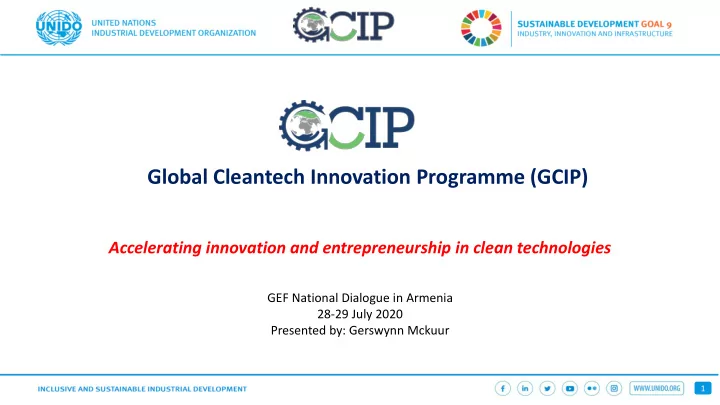

Global Cleantech Innovation Programme (GCIP) Accelerating innovation and entrepreneurship in clean technologies GEF National Dialogue in Armenia 28-29 July 2020 Presented by: Gerswynn Mckuur 1
Project Overview Country: Armenia Project title: Fostering cleantech innovation and entrepreneurship for increased economic competitiveness, greening of agriculture value chains and job creation in Armenia GEF Implementing Agency(ies) UNIDO Type of Trust Fund: GEF- TF GEF Focal Area (s) Climate Change Mitigation GEF Priorities included Clean technology Innovation, EE, Mini-grids with storage, EV, other GEBs Duration: 60 Months Proposed National Executing SME Development National Center of Armenia (SMEDNC) Partner(s): Estimated Project Cost ($): $1,000,000 2
Project Core Indicators Expected at PIF 6 Greenhouse Gas Emissions Mitigated (metric tons of Indicative expected results of 108,000 to CO2e) 216,000 tCO2e of direct emission savings and of 540,000 to 1,080,000 tCO2e of indirect emission savings 11 Number of direct beneficiaries disaggregated by gender Target of 300 participants (with at least 35% as co-benefit of GEF investment women) : 60 enterprises - 60 cleantech experts ( mentors, judges) - trained and certified 180 participants sensitized - 3
Project Objectives The project seeks to promote the introduction of innovative clean technologies supporting the expansion and greening of value chains in Armenia. Through supporting local start-ups to grow their businesses, the project will ultimately boost employment and income generation and unlock investments. The introduction of cleantech innovations will contribute towards: • promoting sustainable use of natural resources (water, energy, materials) • increasing the share of renewable, energy efficiency and recycled resources at the input side of the value chain, • increasing market competitiveness of the export oriented industry, • unlocking international investments in the sector among others • strengthening response mechanisms and resilience to emerging challenges such as COVID-19 4
Bridging the Valley of Death in Cleantech Innovation Cleantech 1. Entrepreneurship and 2. Policy and 4. Building Capacities 3. Link SMEs to Innovations/ business acceleration of regulatory Market of National Financing SMEs innovations Institutions Ideas New products and services SMEs / entrepreneurs _________________ _________________ New green jobs Start-ups _________________ _________________ Creating New Industries Funded Research _________________ 1. Weak policies & 3. Weak 2. Innovations 4. Weak regulations innovation not accelerated institutions Environment protection ecosystem 5
Integrating Lessons learned • Need for increase ownership and commitment of government Pillar 1. agencies represented in the Project Steering Committee to ensure Pillar 2. the sustainability and replication potential of results Transforming Cleantech early-stage • Stimulate interest among ministries concerned with SMEs and low innovation and innovative carbon solutions to establish linkages between ongoing projects and entrepreneurship cleantech ecosystems new clean tech activities solutions into strengthening and • Ensuring to avoid overstretching of implementation capacities and commercial connectivity enterprises mobilizing enough resources to be able to engage adequately • Increase country ownership by preparing for a gradual handover of responsibility during the project life using the learning by doing approach Pillar 3. • Integrate a long term strategy and process that creates awareness of Programme and Impact different stakeholders, a good understanding of complex issues Monitoring • During Phase I, it became evident that there are limited governmental resources for seed funding of start ups and SMEs, thus other possible sources should be identified such as successful Armenian diaspora businesses, PFAN 6
Participating Countries Phase 1&2 Moldova Ukraine Pakistan Morocco Armenia Turkey Kazakhstan Cambodia Thailand Malaysia Nigeria Phase I India Phase II Phase I and II Indonesia Uruguay South Africa Disclaimer: This map is being used for illustrative purposes only.
Contact Us Stay connected via Twitter @GCIPsmes #GCIP Send us an email gcip@unido.org Thank you!! Mr. Gerswynn Mckuur Climate Technology and Innovations Division Email: g.mckuur@unido.org 8
Recommend
More recommend